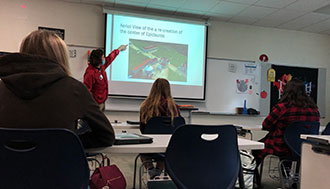Richard Paige — Lengthy term papers can have the feel of Sisyphus trying to move a boulder uphill, especially in the spring when attentions naturally drift to the end of the academic year.
What’s a professor to do when planning a seminar class for five seniors all with different academic paths to this capstone?
After consulting with colleagues about what could be possible, Associate Professor of Classics and Department Chair Bronwen Wickkiser decided the seminar would focus on healing offered by Asklepios, a god worshipped for more than a thousand years and whose sanctuaries were present in both the Greek and Roman worlds.
Beginning in January, the students – Austin Chivington, Charlie Esterline, Billy Johnson, Ben Klimczak, and Nikko Morris – began discussing what was possible. In addition to talking about what was listed on the syllabus, the group carved out 20 minutes each session to identify and plan for an audience.
In a nod to the current pandemic, a focus on healthcare could satisfy interests of culture and geography, and, certainly, timeliness.

“As classics students, we know that plagues have come and gone and that ancient civilizations had their own health and healing cultures,” said Chivington. “Studying how the ancients thought about healing and health could offer for us some lessons about how we can think about this public health crisis, as well as what healing could look like for our own communities in a holistic way.”
Wickkiser’s charge was for the students to make this their own.
“The students had to be the drivers behind the project: the visionaries, the designers, the organizers, negotiators, and presenters,” she said. “I wanted the students to take their knowledge beyond the walls of Wabash.”
With an assist to Morris, who completed his student teaching in the seventh grade at Crawfordsville Middle School, the group was invited to visit sixth grade social studies classes in late April.
Next came the hard part: finding common ground between the college seniors and 12-year-olds. Fortunately, there were a few symbols in use today that bridged the gap.
“Asklepios’ staff and serpent is on EMT vehicles, hospital logos, the World Health Organization’s logo, and many more,” explained Esterline. “We wanted to demonstrate to the students that these symbols are already in our everyday life, we needed provide the context on where they came from.”
The middle schoolers were given plenty of opportunity to participate, whether it be finding a place on a map or reading a healing account from a slide. Every student was given an ancient name, hometown, and ailment for which they sought help from Asklepios. In class, they “visited” a sanctuary to see how they would have been healed.
This allowed for plenty of feedback from the students, mostly in the form of questions.
“Taking college level material and explaining it to younger students can be a challenge, so breaking it down into language they understand was essential,” Johnson said. “These students really impressed me with their understanding of the material in the short time we had to teach them as well as how much they seemed to enjoy and engage with the material presented to them.”
Johnson was quick to credit Morris with driving the classroom management portion of the presentation. His own in-class experience allowed for the Classicists to create an environment where questions flowed freely without getting too far off topic.
Morris took value in teaching both groups.
“The experience of getting to teach my fellow classicists how to communicate college level material to sixth-grade classrooms was fun to do,” he said, “because it’s much different than doing a presentation to fellow college students. It’s visible to students when you really enjoy the content. Students are inclined to have more fun because of educator interest and excitement.
That sentiment was shared by his classmates, too.
“Our passion for the study of the ancient world is something we rarely can share outside our classical troupe,” Chivington said. “Being able to share this passion with others and passing that excitement on, especially with a topic like this at such a challenging time, was the ideal avenue for our capstone.”

